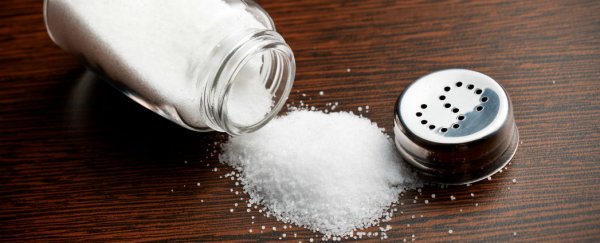There's a growing movement of scientists who say government recommendations when it comes to salt aren't based on sound scientific evidence, and could actually pose a health risk to those who strictly follow them.
Right now, the US federal government has advised that Americans consume no more than 2,300 milligrams of sodium per day, which means you can have a teaspoon of salt over a 24-hour period, and then you're done. For African-Americans and those over 50, the guidelines recommend an even smaller amount - 1,500 milligrams per day. The Australia New Zealand Food Standards Board and the Australian Heart Foundation also recommend no more than 2,300 milligrams a day.
And if that sounds pretty stingy to you, it is, and most of us struggle to keep to that amount. As a result, governments around the world are frequently advising the public that they're eating too much salt - Americans are averaging about 3,500 milligrams per day - and say it's contributing to all kinds of very serious, and often fatal, heart conditions. Enter isles full of 'low salt' and 'low sodium' products designed to save us from ourselves in the blandest way possible.
Where did this "one teaspoon or less" amount come from, and what scientific evidence is it based on? Peter Whoriskey over at The Washington Post has done some investigating, and the answers to both these questions are surprisingly - and disconcertingly - vague.
"There is no longer any valid basis for the current salt guidelines," Andrew Mente from McMaster University in Canada, who was involved in major 2014 study in the New England Journal of Medicine regarding salt consumption, told Whoriskey. "So why are we still scaring people about salt?"
If you look back into the history of the US government's salt regulation, you'll find a strong basis on research that has shown that in certain people, blood pressure can be lowered by simply restricting your salt intake. And because high blood pressure has been linked to cardiac disease, if you're conservative with your salt, you're doing something positive for your heart.
But how much lower can your blood pressure get, just from reducing your salt intake? Not much, says Whoriskey:
"The blood-pressure reductions that come from abstaining from salt are relatively small on average, because individuals vary widely in their reactions. (An average person who reduces his or her salt intake from median levels to the US recommended levels may see a drop in blood pressure from 120/80 to 118/79, according to American Heart Association figures.)"
Another influential study on which the salt intake recommendations have been based is a 1973 paper by anthropologist Lillian Gleiberman from the University of Michigan, who found that not only did Eskimos, the African Bushmen, the Chimbu of New Guinea, and the Caraja of Brazil have the lowest blood pressure levels of any society in the world, they also consumed a very small amount of salt.
But even Gleiberman herself said that a growing body of scientists are arguing that the average healthy person can have up to 6,000 milligrams of sodium per day without endangering their health. And some say that if you're consuming less than 3,000 milligrams a day, you're putting yourself at an unnecessary risk. And yes, this means if you're sticking to the US and Australian guidelines, you could be in trouble.
The aforementioned 2014 New England Journal of Medicine study of 100,000 people found that people who stuck to the government's salt intake guides were actually having more heart trouble than those who were a bit more lax with their sodium. "To explain their findings, these researchers pointed to studies suggesting that low sodium may stimulate the production of renin, a hormone that may have harmful effects on blood vessels," says Whoriskey.
Confused? Well, so is everybody, and as the US federal government figures out its Dietary Guidelines for 2015, they're going to have to choose to take new research into account, or stick to what they've always recommended. What we're dealing with here is a whole lot of inconclusive evidence, and the challenge going forward is figuring out how to consolidate this into something that can reliably inform the official health recommendations of governments around the world - a tall order by any measurement.
Head over to Whoriskey's article at The Washington Post for a more comprehensive look into the history of the demonisation of salt. I can't say I'm not a little invested in what the decision will be. Let's face it - for all its ambigious health effects, one thing's for sure - salt makes everything delicious.
Source: The Washington Post
